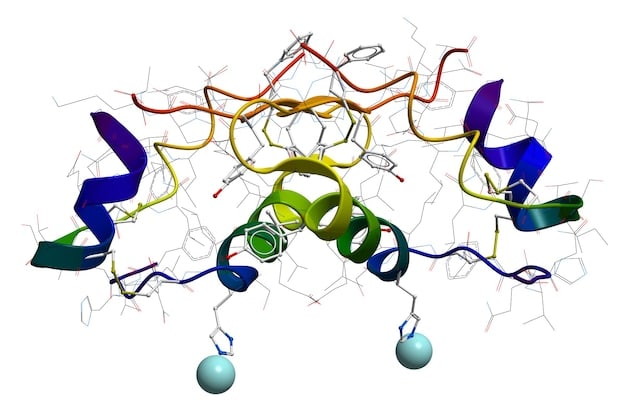Supplement Stack Strategy: Optimal Results & Timing

Achieving optimal athletic or fitness results through supplementation requires a carefully planned supplement stack strategy, focusing on what to take and precise timing for enhanced performance, recovery, and overall health.
In the expansive and often overwhelming world of fitness and nutrition, developing an effective Supplement Stack Strategy: What to Take and When for Optimal Results stands as a critical endeavor for anyone serious about elevating their physical performance and recovery. It’s not just about taking supplements; it’s about understanding the synergy between specific compounds and the precise timing of their intake to unlock your body’s full potential.
Understanding the Foundation of Supplement Stacking
Building a successful supplement stack strategy begins with a fundamental understanding of what supplementation truly entails and why a strategic approach is paramount. Many individuals perceive supplements as magic pills, a belief that often leads to disappointment and wasted resources. In reality, supplements are precisely what their name implies: aids designed to complement, not replace, a solid foundation of proper nutrition, consistent training, and adequate rest.
The human body is an intricate system, constantly striving for homeostasis even under the stress of intense physical activity. Supplementation, when executed wisely, can help maintain this balance, providing essential nutrients that might be difficult to obtain solely through diet, or offering ergogenic benefits that directly enhance performance or recovery pathways. The “stack” aspect refers to combining multiple supplements to achieve a synergistic effect, where the combined impact is greater than the sum of individual supplements.
This holistic view is crucial. Instead of randomly acquiring products based on fleeting trends or aggressive marketing, a strategic stack considers your individual goals, dietary habits, training intensity, and even potential deficiencies. It’s about creating a personalized regimen that addresses specific needs, whether that’s increasing strength, enhancing endurance, accelerating recovery, or improving overall well-being. For seasoned athletes and casual gym-goers alike, this level of intentionality is what truly differentiates haphazard consumption from results-driven supplementation.
The real power of a supplement stack is unlocked when timing comes into play. The body’s physiological state changes throughout the day, particularly around training sessions. Nutrients are absorbed and utilized differently pre-, intra-, and post-workout, and even during periods of rest or sleep. Therefore, understanding the optimal window for each supplement is not merely an afterthought but a core pillar of an effective strategy. This nuanced approach ensures maximum bioavailability and efficacy, turning potential into tangible gains. Without this foundational understanding, even the most expensive and potent supplements might fail to deliver their promised benefits.
Essential Supplements for Any Training Regimen
While the supplement market is vast and often confusing, certain core supplements consistently prove their value across various training disciplines. These are the building blocks of almost any effective stack, serving fundamental physiological roles that support performance, recovery, and general health. Identifying these essentials is the first step in constructing a sensible and effective supplement strategy, regardless of your ultimate fitness goals.
Creatine Monohydrate: The Powerhouse Supplement
Creatine is arguably the most researched and effective supplement for enhancing strength, power, and muscle mass. It functions by increasing the body’s store of phosphocreatine, which is vital for rapidly regenerating ATP – the primary energy currency of cells – during high-intensity, short-duration activities. This means you can perform more reps, lift heavier, and recover faster between sets.
- Function: Enhances ATP production for explosive power.
- Benefits: Increased strength, power, muscle growth, and improved exercise performance.
- Timing: While timing isn’t as critical for creatine due to its cumulative effect, taking 3-5 grams daily, perhaps post-workout or in the morning, ensures consistent muscle saturation.
The vast body of scientific evidence supporting creatine’s safety and efficacy makes it a cornerstone of nearly any supplement stack aiming for performance enhancement. Its benefits extend beyond the gym, with emerging research suggesting cognitive advantages too.
Whey Protein: The Muscle Builder
Protein is the fundamental building block of muscle tissue, and whey protein is a rapidly absorbed, high-quality source. It’s rich in essential amino acids, particularly branched-chain amino acids (BCAAs), which are crucial for muscle protein synthesis.
- Function: Provides amino acids for muscle repair and growth.
- Benefits: Promotes muscle protein synthesis, aids in recovery, and supports lean muscle mass.
- Timing: Best consumed post-workout (within 30-60 minutes) to kickstart recovery, but also effective throughout the day to meet protein targets.
Whey protein’s versatility makes it indispensable. Whether mixed with water as a quick post-workout shake or blended into smoothies, it offers a convenient and effective way to fulfill daily protein requirements, especially for those with high training volumes. Adequate protein intake is vital not only for muscle hypertrophy but also for overall satiety and metabolic health.
Beyond these, consider a high-quality multivitamin to cover potential micronutrient gaps, and possibly Omega-3 fatty acids for their anti-inflammatory properties and cardiovascular benefits. These foundational supplements provide a robust base, ensuring your body has the raw materials it needs to perform and recover optimally, acting as the bedrock upon which more specialized supplements can be added.

Optimizing Pre-Workout Performance
The period leading up to a training session is a critical window for priming your body for optimal performance. Pre-workout supplements are designed to enhance energy levels, focus, strength, and endurance, allowing you to push harder and get more out of your workout. However, a thoughtful approach is required to select the right compounds and time their intake effectively to avoid jitters or a rapid energy crash.
Caffeine: The Energy Booster
Caffeine is a well-known stimulant that acts on the central nervous system to reduce fatigue and increase alertness. It’s highly effective for boosting exercise performance, particularly in terms of endurance and power output. Its mechanism involves blocking adenosine receptors, which typically promote relaxation and drowsiness.
- Function: Increases alertness, reduces perceived exertion, enhances performance.
- Benefits: Improved anaerobic power, endurance, and mental focus.
- Timing: Typically consumed 30-60 minutes before training to allow for absorption and peak effects. Dosage varies, but 150-300mg is a common effective range for many individuals.
Given its ubiquitous presence, managing caffeine intake from all sources is important to prevent overstimulation or tolerance building. Consider personal sensitivity and avoid late-day consumption to prevent sleep disturbances.
While caffeine provides an immediate boost, other compounds work more subtly to enhance performance over time or via different physiological pathways. Beta-alanine, for instance, indirectly aids in muscle buffering, delaying the onset of fatigue. Citrulline malate, on the other hand, contributes to nitric oxide production, promoting better blood flow to working muscles. These elements contribute to a more comprehensive pre-workout readiness state.
Beta-Alanine: The Fatigue Fighter
Beta-alanine helps increase muscle carnosine levels, which act as an intracellular buffer against lactic acid buildup. This delays fatigue and allows for more prolonged high-intensity efforts, particularly beneficial for resistance training and interval sports.
- Function: Buffers lactic acid, reducing muscle fatigue.
- Benefits: Increased muscular endurance and exercise capacity.
- Timing: Can be taken pre-workout (2-5g) to feel the immediate “tingle,” but daily dosing (spread out, if preferred) is more important for carnosine saturation.
The “tingling” sensation (paresthesia) is a common side effect but is harmless and usually subsides with continued use or by splitting doses. Beta-alanine is a long-term benefit supplement; its effects are cumulative, so consistency is key.
Another popular pre-workout ingredient is L-tyrosine, an amino acid that can support mental focus under stress. It contributes to the production of neurotransmitters like dopamine and norepinephrine, which play roles in mood, attention, and cognitive function. Combining these components—caffeine for energy, beta-alanine for endurance, and L-tyrosine for focus—creates a potent synergy that prepares both body and mind for the demands of intense training. The goal isn’t just to feel energized but to enhance every aspect of your workout performance systematically.
Maximizing Intra-Workout Efficiency
The during-workout phase is often overlooked in supplement strategies, yet it presents a crucial opportunity to sustain performance, prevent muscle breakdown, and prime the body for faster recovery. While not every workout necessitates intra-workout supplementation, intense or prolonged sessions can significantly benefit from strategic nutrient delivery. The primary goal is to maintain energy levels and reduce muscle catabolism, thereby extending peak performance and accelerating the repair process.
Branched-Chain Amino Acids (BCAAs): Muscle Protection
BCAAs (leucine, isoleucine, and valine) are essential amino acids that play a direct role in muscle protein synthesis and energy production during exercise. While a diet rich in protein often supplies sufficient BCAAs, supplementing during a workout can provide an immediate supply of these crucial amino acids, especially when training in a fasted state or during prolonged exercise.
- Function: Provides readily available muscle fuel, reduces muscle breakdown.
- Benefits: Supports muscle protein synthesis, reduces fatigue, aids in muscle recovery.
- Timing: Sipped throughout the workout, particularly beneficial during extended or high-volume sessions. A typical dose ranges from 5-10 grams.
The emphasis on BCAAs during training primarily revolves around their potential to reduce muscle protein breakdown, or catabolism. During strenuous activity, especially when glycogen stores are depleted, the body may turn to muscle protein for energy. BCAAs help mitigate this, preserving muscle tissue. Leucine, in particular, is a potent activator of the mTOR pathway, a key regulator of muscle growth. While protein shakes themselves contain BCAAs, the quick absorption of isolated BCAAs can be advantageous during intense physical exertion.
Carbohydrates: Sustained Energy
For longer or more intense training sessions (e.g., endurance events, strength training over an hour), intra-workout carbohydrates are invaluable. They provide a sustained energy source, preventing glycogen depletion and maintaining blood glucose levels, which helps to delay fatigue and maintain performance.
- Function: Replenishes glycogen stores, maintains energy levels.
- Benefits: Sustained performance, delayed fatigue, improved recovery from prolonged exertion.
- Timing: Consumed throughout the workout. Rapidly absorbed carbs like dextrose or maltodextrin are often preferred, typically in doses of 20-60 grams depending on duration and intensity.
Combining fast-acting carbohydrates with BCAAs can create a powerful intra-workout fuel source. The carbohydrates provide the necessary energy to sustain performance, while BCAAs work to protect muscle tissue from breakdown. This dual approach ensures that your body has both the fuel to perform and the building blocks to prevent undoing the hard work you’re putting in. This strategy not only supports immediate performance but also lays the groundwork for more efficient post-workout recovery, minimizing the catabolic environment created by intense exercise.
Accelerating Post-Workout Recovery
The period immediately following a workout is arguably the most critical for recovery, muscle repair, and growth. This “anabolic window,” while perhaps not as rigid as once thought, remains a prime opportunity to replenish nutrients, reduce muscle soreness, and kickstart the adaptation process. A strategic post-workout supplement stack focuses on rapid nutrient delivery to facilitate muscle protein synthesis and glycogen replenishment.
Whey Protein: Rapid Recovery
As mentioned earlier, whey protein is paramount post-workout. Its fast absorption rate means amino acids are quickly delivered to damaged muscle tissues, initiating the repair and rebuilding process. Isolate forms of whey can be even faster-acting, with minimal fat or lactose.
- Function: Delivers amino acids for immediate muscle repair.
- Benefits: Maximizes muscle protein synthesis, reduces muscle damage, enhances recovery.
- Timing: As soon as possible post-workout, ideally within 30-60 minutes. A typical dose is 20-40 grams, depending on body weight and training intensity.
Combining whey protein with a source of fast-acting carbohydrates is a classic and highly effective strategy. The carbohydrates facilitate insulin release, which aids in shuttling amino acids into muscle cells and replenishes depleted glycogen stores. This synergistic effect optimizes the post-exercise anabolic state, ensuring that the body rapidly transitions from a catabolic (breakdown) to an anabolic (building) state.
Carbohydrates: Glycogen Replenishment
Replenishing muscle glycogen is essential, especially after intense or prolonged workouts that deplete energy reserves. Fast-digesting carbohydrates, such as dextrose, maltodextrin, or even simple sugars from fruits, are ideal for this purpose.
- Function: Restores muscle and liver glycogen stores.
- Benefits: Speeds up recovery, reduces muscle soreness, prepares muscles for the next session.
- Timing: Immediately post-workout, alongside protein. The amount needed depends on the intensity and duration of the exercise, but generally ranges from 0.8-1.2g/kg body weight.
Beyond protein and carbohydrates, consider the addition of specific recovery aids. Glutamine, an abundant amino acid in the body, is often touted for its role in muscle repair and immune function, especially after strenuous exercise. While the scientific evidence for its direct impact on muscle growth beyond adequate protein intake is still debated, some athletes find it beneficial for reducing soreness and supporting recovery. Similarly, Omega-3 fatty acids, with their potent anti-inflammatory properties, can help mitigate post-exercise muscle soreness and support overall joint health, contributing to a more effective recovery process in the long run.
Ultimately, a robust post-workout strategy is about creating an optimal environment for supercompensation—where the body adapts and rebuilds stronger than before. This involves not only macronutrient timing but also ensuring sufficient hydration and micronutrient intake to support the complex biochemical processes of recovery.
Nighttime and General Health Supplements
Recovery extends far beyond the post-workout window; it’s a continuous process that is significantly influenced by what happens during sleep and throughout the rest of your day. Strategic supplementation during these non-training periods can optimize overall health, support hormone balance, and enhance the restorative processes crucial for long-term progress. These supplements aren’t about immediate performance boosts but rather sustained well-being and adaptation.
Casein Protein: Slow and Steady Anabolism
Unlike fast-digesting whey, casein protein is a slow-digesting protein, meaning it releases amino acids gradually into the bloodstream over several hours. This extended release makes it an ideal protein source before bed, providing a steady supply of amino acids to muscles throughout the night, preventing catabolism during extended periods without food.
- Function: Provides sustained amino acid release.
- Benefits: Reduces muscle breakdown during sleep, supports overnight muscle repair and growth.
- Timing: Best consumed 30-60 minutes before bedtime. A typical dose is 20-40 grams.
The “anti-catabolic” properties of casein are particularly valuable for those aiming to maximize muscle mass or undergoing periods of caloric restriction. By providing a constant trickle of amino acids, it helps to maintain a positive nitrogen balance, which is conducive to muscle anabolism.
ZMA (Zinc, Magnesium, Vitamin B6): Sleep and Recovery
ZMA is a popular supplement blend containing zinc monomethionine aspartate, magnesium aspartate, and vitamin B6. These are essential minerals and vitamins often deficient in athletes, playing crucial roles in hormone production, nerve function, and sleep quality.
- Function: Supports testosterone production, muscle function, and sleep quality.
- Benefits: Improved sleep, enhanced recovery, potentially normalized hormone levels.
- Timing: Taken 30-60 minutes before bedtime on an empty stomach for optimal absorption.
Adequate sleep is non-negotiable for recovery and performance. Deficiencies in zinc and magnesium can impair sleep quality and testosterone levels, both of which are vital for muscle repair and strength. ZMA addresses these potential deficiencies, helping to optimize the body’s natural restorative processes during rest.
Beyond these, general health supplements like a high-quality Omega-3 fish oil (for anti-inflammatory benefits and brain health), Vitamin D3 (essential for bone health, immune function, and mood), and probiotics (for gut health and nutrient absorption) contribute significantly to overall well-being. While not directly performance-enhancing in the acute sense, maintaining optimal health creates the best possible environment for training adaptations and long-term progress. These supplements fill nutritional gaps and support the intricate processes that underpin physical and mental resilience, ensuring that your body is fully prepared for the next challenge.
Tailoring Your Stack to Specific Goals
While foundational supplements provide a universal benefit, an advanced supplement stack strategy involves modifying your choices based on hyper-specific goals. Whether your aim is rapid fat loss, significant muscle gain, or peak endurance performance, tailoring your stack requires a nuanced selection of synergistic compounds. This personalized approach moves beyond general wellness to targeted physiological support, ensuring every supplement contributes directly to your unique objectives.
For Muscle Gain (Hypertrophy)
Beyond core protein and creatine, those focusing on muscle gain might consider additions that enhance protein synthesis, reduce breakdown, or improve nutrient partitioning.
- HMB (Beta-hydroxy-beta-methylbutyrate): A metabolite of leucine, HMB is thought to reduce muscle protein breakdown, especially during intense training or caloric deficits. It helps preserve muscle mass and potentially accelerate recovery by minimizing muscle damage.
- Ursolic Acid: Found in apple peels, research suggests it might have anabolic effects by reducing muscle atrophy and promoting muscle growth, though more human studies are needed. It’s an intriguing compound for those exploring cutting-edge natural anabolics.
- Digestive Enzymes: Essential for maximizing nutrient absorption, particularly of protein. While not directly anabolic, ensuring your body can fully utilize the protein you consume is crucial for muscle growth.
The emphasis here is on creating a maximally anabolic environment while minimizing catabolism. This involves not only providing ample building blocks but also ensuring their efficient utilization and reducing the impact of strenuous training on muscle tissue.
For Fat Loss (Cutting)
Fat loss stacks prioritize thermogenesis, appetite suppression, and fat mobilization, while still aiming to preserve lean muscle mass.
- Green Tea Extract (EGCG): Rich in antioxidants and catechins, EGCG can boost metabolism and fat oxidation. It works synergistically with caffeine to enhance thermogenesis.
- L-Carnitine: Plays a crucial role in transporting fatty acids into the mitochondria, where they are burned for energy. While research is mixed, some find it beneficial, especially in conjunction with caloric restriction and exercise.
- Yohimbine: A potent alpha-2 adrenergic receptor antagonist, yohimbine can help mobilize stubborn fat, particularly from areas resistant to traditional fat loss. It should be used cautiously due to potential side effects like increased heart rate or anxiety.
The synergy in a fat loss stack is critical. Compounds that boost metabolism are often paired with those that suppress appetite and improve lipolysis, creating a multi-faceted attack on body fat while attempting to preserve hard-earned muscle. The timing of these supplements, particularly stimulants, also becomes more crucial to manage energy levels and avoid sleep disruption during a caloric deficit.
Regardless of the specific goal, patience and consistency remain paramount. No supplement can substitute for disciplined training and a well-structured diet. Supplements should be seen as tools to optimize an already robust foundation, pushing the boundaries of what’s possible when every other variable is aligned. Regular assessment of progress and adaptation of the stack based on individual response are key to achieving sustainable and optimal results.
Common Pitfalls and Best Practices
Navigating the supplement landscape can be complex, and even experienced individuals can fall prey to common pitfalls. An effective supplement stack strategy isn’t just about what to take and when, but also how to approach supplementation safely and sustainably. Avoiding common mistakes and adhering to best practices ensures both efficacy and safety, preventing wasted effort or, worse, adverse health outcomes.
Avoiding Over-Supplementation
One of the most prevalent mistakes is taking too many supplements, often driven by aggressive marketing or a “more is better” mentality. Over-supplementation can lead to several issues:
- Diminished Returns: Beyond a certain point, adding more supplements provides diminishing, or even negative, returns. Your body can only absorb and utilize so much.
- Nutrient Imbalances: Excessive intake of one nutrient can interfere with the absorption or function of another, creating unexpected deficiencies or toxicities.
- Financial Waste: Many supplements are expensive. Pouring money into unnecessary products detracts from investing in more impactful aspects like quality food or coaching.
A minimalist approach, focusing on proven supplements that address specific needs, is often more effective and safer. Prioritize quality over quantity, and always be critical of marketing claims. Don’t fall for every new “breakthrough” product without solid scientific backing.
The Importance of Quality and Purity
The supplement industry is not as tightly regulated as pharmaceuticals, leading to variations in product quality and purity. Choosing reputable brands that conduct third-party testing is crucial to ensure you’re getting what’s advertised on the label, without contaminants or undeclared ingredients.
- Third-Party Certifications: Look for certifications from organizations like NSF Certified for Sport or Informed-Sport. These indicate products have been tested for banned substances and contaminants.
- Transparency: Reputable brands will be transparent about their ingredients, dosages, and manufacturing processes. Avoid proprietary blends that don’t disclose exact ingredient amounts.
Purchasing from trusted retailers and doing your research on brands can save you from ineffective or even dangerous products. The adage “you get what you pay for” often holds true in the supplement world.
Furthermore, integrating supplements with a well-balanced diet and consistent training is non-negotiable. Supplements are designed to complement, not replace, these pillars. A poor diet cannot be fully rectified by supplements, nor can inconsistent training habits be magically overcome. Consider consulting with a healthcare professional or a registered dietitian before beginning any new supplement regimen, especially if you have pre-existing health conditions or are taking medications. They can provide personalized advice and help identify potential interactions or contraindications, ensuring your supplement strategy is safe, effective, and tailored to your unique physiological needs.

| Key Aspect | Brief Description |
|---|---|
| 🏋️ Core Supplements | Creatine, Whey Protein, Multivitamin are foundational for performance and health. |
| ⏰ Timing is Key | Optimize pre-workout energy, intra-workout endurance, and post-workout recovery. |
| 🎯 Goal-Specific Stacks | Tailor supplements for muscle gain, fat loss, or endurance to enhance specific outcomes. |
| ✅ Quality & Safety | Choose third-party tested products and avoid over-supplementation for best results. |
Frequently Asked Questions
▼
No, supplements are not strictly necessary for everyone, especially if you have a well-balanced diet and moderate activity levels. They are primarily designed to fill nutritional gaps, enhance performance, or accelerate recovery for those with higher demands, like athletes or individuals with specific dietary restrictions. Prioritizing whole foods and consistent training should always come first.
▼
While creatine’s effects are cumulative over time, some studies suggest taking it post-workout with carbohydrates can slightly enhance absorption due to insulin spikes. However, consistency is more important than precise timing. A daily dose of 3-5 grams (after an optional loading phase) will saturate your muscles effectively, whether consumed in the morning, pre- or post-workout.
▼
Absolutely. Women can and do benefit significantly from creatine for strength and power, just as men do. Other supplements like protein powders, BCAAs, and even pre-workouts are equally effective for women, helping with muscle growth, recovery, and energy levels. Dosage might need adjustment based on body weight and goals, but the physiological benefits are universal.
▼
The time frame for results varies widely depending on the supplement, individual response, consistency of use, and alignment with diet and training. Some effects, like caffeine’s energy boost, are immediate. Others, like creatine’s strength gains or muscle growth from protein, can take weeks to months of consistent use. Patience and proper evaluation are key.
▼
Yes, while generally safe when used correctly, some supplements can have side effects. For example, high doses of caffeine can cause jitters or anxiety. Some pre-workouts might cause a “tingling” sensation (beta-alanine). Over-supplementation can lead to digestive issues or nutrient imbalances. Always start with lower doses, consult a professional, and discontinue use if adverse reactions occur.
Conclusion
Developing a sophisticated supplement stack strategy is about more than just grabbing bottles off a shelf; it’s a calculated endeavor that synergizes scientific understanding with individual physiological needs. By meticulously selecting what to take and, crucially, when to take it, you can unlock enhanced performance, expedite recovery, and ultimately achieve optimal results in your fitness journey. This journey is continuous, demanding ongoing evaluation and adaptation to ensure your stack evolves with your goals and body’s responses, solidifying supplements as highly valuable tools within a well-rounded health and fitness regimen.





